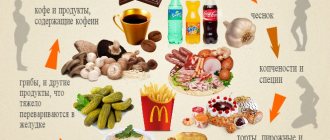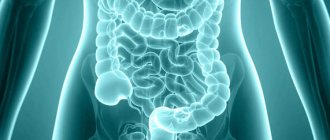Heartburn during pregnancy is a fairly common phenomenon, often occurring even in cases where the woman had never encountered such a problem before pregnancy. Most often, heartburn begins to bother pregnant women in the later stages, in the second or third semester. What is the cause of heartburn during pregnancy and how to deal with it?
Causes of heartburn during pregnancy
Heartburn in pregnant women is a condition that is caused by changes that occur in the female body during pregnancy. All factors that can cause heartburn in women in an interesting position can be divided into physiological (natural) and pathological (associated with diseases).
Physiological heartburn in pregnant women can occur for two reasons:
- Hormonal – associated with weakening of the tone of the lower esophageal sphincter. This is the name of the circular muscle between the stomach and esophagus, which regulates the flow of food into the stomach and prevents its movement in the opposite direction. During pregnancy, the level of progesterone in the blood increases, which relaxes the uterine muscle, simultaneously acting on all other muscles of the body, including the esophageal sphincter. As a result, the sphincter does not close after eating, but remains open. Any change in body position or contraction of the stomach causes reflux of food4. Heartburn also occurs if the movement of food through the esophagus is disrupted, for example, if the frequency of “reverse” contractions of the esophagus in the direction from the stomach to the esophagus increases1.
- Physical – due to an increase in the size of the uterus, the location of internal organs changes and intra-abdominal pressure increases, which is transmitted to the wall of the stomach and promotes reflux4.
Due to such changes in the gastrointestinal tract during pregnancy, all pathologies that cause heartburn may worsen.
Pathological causes of heartburn during pregnancy include the following:
- Gastroesophageal reflux disease (reflux esophagitis) is a pathology of the esophageal sphincter, which occurs more often with a hernia of the diaphragm, when the natural bend between the esophagus and the stomach disappears, preventing reverse reflux4.
- Other diseases of the gastrointestinal tract are gastritis, peptic ulcer of the stomach and duodenum, pancreatitis, liver and biliary tract diseases, inflammatory bowel diseases2. With gastritis and ulcers, the acidity of the stomach increases, and pathologies of other digestive organs cause bloating, constipation, and enlarged liver, which increases intra-abdominal pressure.
- Taking medications that relax the lower esophageal sphincter - cardiac medications, theophylline, anti-inflammatory drugs, progesterone, antidepressants4.
Taste preferences change.
A woman may have an aversion to food that she used to love. Another option is also possible: a sudden craving for foods that you don’t like in taste or smell. Loss of appetite, especially against a background of constant nausea and malaise, as well as constant hunger, are common signs of pregnancy in the early stages. The desire to try something inedible or in an unusual combination is more typical for 4-12 weeks of pregnancy, but there are cases when a woman notices this symptom already at 2-4 weeks. It is quite possible that the desire to taste chalk or eat a sausage sandwich thickly spread with orange jam is the body’s attempts to report a lack of microelements in the body. There is no need to worry ahead of time: carrying a child requires a large amount of resources, so the body tries to prepare in time and collect reserves “for two.”
What to do if you have heartburn during pregnancy?
In the first two hours after eating, the stomach produces hydrochloric acid, which is needed to process food. It is at this time that heartburn is more common, especially if a woman eats fatty, fried and spicy foods7. A burning sensation behind the breastbone can last for several minutes or several hours. Heartburn may recur several times during the day. It is characterized by its intensification in a horizontal position, when bending the body, and also when turning to the other side.
To reduce the severity of heartburn, you first need to adjust your diet and some habits. This helps reduce stomach acidity and prevent food from refluxing into the esophagus.
Pregnant women should follow the following dietary recommendations4:
- Do not eat excessively high-calorie foods.
- Avoid night snacks and especially overeating.
- Eat often and in small portions.
- Do not lie down immediately after eating, do not sleep in a strictly horizontal position, you must raise the head of the bed.
- After eating, walk for 30 minutes.
- Have dinner no later than 3-4 hours before going to bed.
- Do not lift heavy objects, do not bend your body too strongly or frequently, and do not overexert your abdominal muscles.
- Do not wear corsets, bandages, or tight belts that increase intra-abdominal pressure.
The following should be excluded from the diet for heartburn:
- Carbonated drinks (they increase pressure in the stomach and stimulate the formation of hydrochloric acid).
- Cream, whole milk, fatty meats, fatty fish, goose, pork (fatty foods take a long time to digest).
- Chocolate, cakes, pastries, spices (relax the lower esophageal sphincter).
- Citrus fruits, tomatoes, onions, garlic (irritate the mucous membrane of the esophagus).
If you have heartburn, pregnant women can eat the following foods6:
- wheat bread, dry biscuits, dry cookies;
- baked pies with apples, boiled meat or fish;
- soups from meat, fish, vegetables;
- lean beef, poultry, fish;
- soft-boiled eggs and omelet;
- sugar, copper, butter cream;
- tea, cocoa, sweet fruit juices, jam, compotes.
Symptomatic therapy
Moderate heartburn, which occurs in the second half of the gestational age, is usually caused by natural causes and responds well to non-drug correction. A woman is recommended to normalize her diet: avoid eating spicy or salty foods, eat 5-6 times a day in small portions. After eating, you should not take a horizontal position or bend over, so as not to provoke reflux. It is better to sleep on a high pillow in a comfortable position; you can use a special pillow for pregnant women.
Before a clinical diagnosis is made, non-absorbable antacids, which do not penetrate the systemic circulation and do not affect the child’s body, help reduce unpleasant chest sensations. To relieve symptoms, prokinetics are recommended; for severe and prolonged burning, antisecretory drugs are prescribed. Intense heartburn during pregnancy, accompanied by other dyspeptic disorders and abdominal pain, is an indication to consult a specialist.
Heartburn medications during pregnancy
In 80% of pregnant women, heartburn disappears after childbirth, but severe heartburn during pregnancy, especially if it lasts for several weeks, can persist after the birth of the baby4.
Often, proper nutrition and following lifestyle recommendations do not always help get rid of heartburn. If heartburn is caused by any disease, adequate treatment of the underlying pathology with medications helps eliminate unpleasant symptoms.
The use of traditional and non-traditional methods of eliminating heartburn during pregnancy is also not effective enough and is even potentially dangerous. Many of the medicinal herbs during pregnancy can be harmful to both the woman and her unborn child4.
Therefore, it is advisable to discuss the choice of drug with a doctor who will help you choose the right remedy for heartburn during pregnancy, paying attention to the safety for the fetus and the potential effect on the course of pregnancy4
The results of epidemiological studies of Omez® 10 mg in the treatment of heartburn in pregnant women indicate the absence of a clinically significant negative effect on pregnancy and the health of the fetus or newborn5.
Omez® 10 mg is available without a doctor’s prescription, but you can take it on your own without specialist advice for no longer than 14 days5.
THERE ARE CONTRAINDICATIONS, YOU MUST READ THE INSTRUCTIONS FOR MEDICAL USE OR CONSULT A DOCTOR.
Survey
Most cases of heartburn during pregnancy are associated with physiological causes, however, for all women with complaints of a retrosternal burning sensation, a gastroenterologist prescribes instrumental and laboratory tests to exclude the organic basis of the complaints. The diagnostic plan includes only methods that are safe for the health of the child and the expectant mother. The most informative for identifying the causes of heartburn in pregnant women are:
- Ultrasonography
. Ultrasound of the abdominal cavity is the main method for diagnosing gastrointestinal diseases during pregnancy, since the method is safe for the child and allows you to evaluate the morphological features of the digestive organs and detect signs of organic pathology. According to indications, a targeted examination of individual organs is carried out. - Endoscopy
. Endoscopy can be prescribed to women at any stage of gestation in the absence of contraindications from other systems. The study is informative for diagnosing lesions of the mucous membrane of the esophagus with GERD; the method also helps to identify signs of chronic diseases of the upper digestive tract. - pH-metry
. Heartburn of any etiology is accompanied by a change in the acid-producing function of the secretory cells of the stomach; to assess the degree of these disorders, daily acidity measurements are performed. Intraesophageal pH-metry, which is performed to monitor treatment and determine prognosis, has a high diagnostic value. - Manometry
. Measuring pressure in the body and lower third of the esophagus in combination with manometry of the lower esophageal sphincter makes it possible to assess the motor function of the gastrointestinal tract and the coordination of muscle groups, and to identify signs of functional dyskinesia. In patients with heartburn, cardiac insufficiency is more often detected. - Functional tests
. A quick alkaline test is performed to confirm the presence of gastroesophageal reflux - the result is positive if, after taking antacids, the woman notices a decrease in the retrosternal burning sensation. An omeprazole test helps confirm the diagnosis - the administration of omeprazole in a standard dose relieves extraesophageal symptoms.
Pregnant women undergo a standard stool examination to determine the level of elastase and fecal antigen of Helicobacter pylori infection. A standard biochemical blood test is performed, gastrin and pepsinogen levels are measured. All women are prescribed a comprehensive gynecological examination, and in some cases the concentration of sex hormones is measured.
Normalizing your diet is the basis for fighting heartburn during pregnancy
Bibliography:
- Vyuchnova E.S., Yurenev G.L., Mironova E.M. “The use of proton pump inhibitors in pregnant women: indications and choice” article in the journal “Evidence-Based Gastroenterology” - 2016.
- ZIMMERMAN Y.S., MIKHALEV E.N. “Possibilities of pharmacotherapy in the treatment of gastroenterological diseases during pregnancy” scientific review – 2015
- Kharkevich D. A. “Pharmacology” textbook – 2010.
- Trukhan D.I., Grishechkina I.A. Treatment of heartburn in pregnancy: focus on alginates. Consilium Medicum. 2016;
- Instructions for the drug Omez®10 mg
- Dietary recommendations of the Scientific Society of Gastroenterologists of Russia for patients with GERD
- "Obstetrics. National Leadership" edited by G.M. Savelyeva - 2022.
Constant fatigue and loss of strength.;
These early signs of pregnancy occur primarily as a result of the body's natural reduction in immune defenses so that the embryo can fully grow and develop. Try to reduce your stress at home and at work and distribute tasks in such a way that you do not get tired. You should not drink a lot of coffee and supplements with a high caffeine content: it depletes the body's internal resources, giving a temporary boost in strength for a short time.
Increase in basal temperature.
The indicator measured rectally varies depending on the woman’s hormonal background. Basal temperature can indirectly determine both ovulation and pregnancy. In the early stages, the rectal temperature rises, and pregnancy is indicated by the fact that there is no decrease in the value after a few days, as with normal cyclic changes. If this is not your first attempt to find the happiness of motherhood, then you most likely know the rules for measuring basal temperature: the correct value is the one obtained immediately after a night's sleep, without getting out of bed. Stress can affect your test results, so it's a good idea to calm down or take a medication approved by your healthcare provider before going to bed.
How to deal with heartburn in early pregnancy
In the first month of pregnancy, the expectant mother should not take most medications so that the components of the drugs do not affect the formation of organs and systems of the fetus. To relieve or ease the burning sensation in the chest, you can use absolutely safe methods.
Diet in early pregnancy:
Does activated charcoal help with heartburn?
- Food should be taken in small portions, but often enough.
- Snacking on the run and overeating are contraindicated.
- When eating food, you must chew each piece thoroughly.
- After waking up, we do not immediately jump out of bed, but carefully chew a nut or cookie and remain in a lying position for another two minutes. This will help prevent morning nausea and heartburn.
- Dinner should be at least 120 minutes before bedtime. When hunger becomes unbearable, you can drink low-fat kefir in small portions or eat two tbsp. l. cottage cheese with honey. The calcium contained in fermented milk products will help neutralize acid and help reduce heartburn and nausea.
Proper nutrition
In addition to natural fermented milk products, which help combat heartburn attacks, you can also eat other foods that contain protein that reduces acidity. A pregnant woman can include in her diet:
- steamed lean fish;
- boiled chicken fillet or beef;
- fresh carrots;
- boiled potatoes;
- dishes based on rice or pasta made from durum wheat;
- semolina porridge;
- oatmeal;
- buckwheat porridge;
- still mineral water;
- green tea;
- dried fruit compote without added sugar;
- baked apples;
- marmalade and marshmallows in limited quantities;
- pears and bananas.
Harmful foods for heartburn
If the expectant mother has heartburn, it is undesirable to eat:
- smoked dishes;
- hot sauces;
- marinades;
- sweet carbonated drinks;
- chocolate, sweets and cakes;
- products made from yeast dough;
- sour apples;
- citrus fruits, plums;
- tomatoes.
Important! When eating, you should give up the habit of drinking water with your food, as this increases the likelihood of heartburn.
If you have heartburn, it is better to avoid sleeping on your back.
Sleeping position
Does heartburn occur from improper sleeping posture? During the period of bearing a baby, it is best to avoid sleeping on your back, as this compresses the veins located under the uterus. This negatively affects the condition of the fetus.
In addition, sleeping on your back causes stomach contents to enter the esophagus, which causes heartburn. It is best to lie down to rest on your side. In this case, both the shoulders and the head should be located slightly higher than the body. A special pillow will help you find a comfortable position.
The right clothes
Starting from the 8th week, the expectant mother’s wardrobe should not contain tight clothes that compress the stomach and increase the tone of the uterus. Until childbirth, the basis of your wardrobe should be loose tunics, T-shirts and dresses.
Treatment with medications during pregnancy
In case of severe heartburn, the doctor prescribes the pregnant woman to take medications that do not have a negative effect on the fetus. The following medications may be prescribed to treat a pregnant woman.
Rennie
An antacid that helps reduce the acidity of gastric juice. Quite often, a medical specialist prescribes Rennie, which does not contain aluminum and does not cause constipation. The action of the tablets is fast and after 5-8 minutes, heartburn will stop tormenting the expectant mother.
Despite the fact that there are no contraindications to taking the medicine in the early stages, doctors try to prescribe tablets only at 18–19 weeks to avoid the risk of negative effects of the composition on the fetus. If a woman is taking an iron supplement, Rennie should not be taken to avoid malabsorption of the mineral. You do not need a doctor's prescription to purchase the drug.
Smecta
An absolutely safe product that can be taken even in the first weeks of pregnancy. Smecta will ideally help not only with diarrhea, but also with the first manifestations of heartburn. However, it is worth remembering that frequent use of the medicine causes constipation, which is unacceptable during pregnancy. A prescription is not required to purchase the drug, but you should first check the recommended dose with your doctor.
Smecta goes on sale in sachets. It is unacceptable to take them more than 3 times a day. You can dissolve the drug in a glass of warm water and drink it 90–120 minutes after eating. You cannot take other medications together with Smecta, as the drug reduces the effectiveness of absorption of the other medication.
Phosphalugel
A popular antacid that is often prescribed to patients suffering from problems with the digestive system and heartburn. Phosphalugel does not pose a danger to the fetus, so the doctor can prescribe it even in early pregnancy. To relieve the symptoms of heartburn, the drug is taken once in the first trimester.
A minor drawback of the medication is that it causes constipation, which is extremely undesirable in the later stages. The drug goes on sale in the form of a powder, which can be washed down with water or pre-dissolved in it. If the medicine taken causes any complications, you must immediately inform your doctor and stop taking Phosphalugel.
However, side effects due to use are rare. Phosphalugel can be used even in the early stages of the first pregnancy.
Symptoms subside in the second trimester
During pregnancy, you may experience all of these signs and symptoms, and some women may only experience one or two. Many of these symptoms you experience in the first trimester will begin to disappear in the second trimester. Be sure to tell your doctor about any symptoms that interfere with your daily life.
Womenfirst
- Pregnancy, childbirth, the first years of a child’s life: to help the expectant mother: [16+] / Larisa Anikeeva. — St. Petersburg: All, 2018.
- Obstetrics and gynecology. 2022, no. 2.
- Obstetrics and gynecology 4th edition revised 2019.
- Research methods in gynecology: educational manual / S. P. Pakhomov, O. B. Altukhova, E. V. Zhernakov 2018
- Educational and methodological manual for classes in the discipline “Gynecology” T. A. Ayvazyan Eco-Vector, 2022.
RUS2216256 (v1.0)











